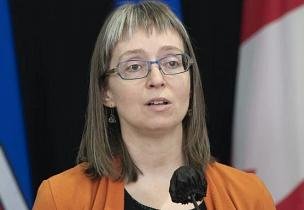Close contacts of COVID-19 variant cases in Alberta may need to isolate for up to 24 days
Alberta’s largest union is calling on the provincial government to offer paid isolation leave for all workers now that the households of positive COVID-19 variant cases may have to self-isolate for up to 24 days.
On Tuesday, Alberta chief medical officer of health Dr. Deena Hinshaw said the household contacts of people who test positive for the more contagious COVID-19 variants, first identified in the U.K. and South Africa, face a lengthier isolation if the person who is sick chooses to stay home instead of one of the select government-approved hotels.
“If cases choose to stay home during their isolation period, their household contacts will now need to stay at home as well in quarantine until 14 days have passed from the end of the case’s isolation period, or a total of 24 days,†Hinshaw said at her daily update.
Susan Slade, vice president of the Alberta Union of Provincial Employees (AUPE), says the provincial government needs to provide isolation pay for workers, unionized or not, or people at risk could break the rules in order to pay the bills.
“While we appreciate that they are putting in some stronger measures to ensure that these variants aren’t spread quickly, they also need to ensure that people are being able to afford to live. You can’t ask people to be off work for 24 days without a paycheque,†she said Wednesday.
Currently, Albertans who are required to self-isolate can apply for the federal Canada Recovery Sickness Benefit (CRSB) that provides $450 after taxes for a one week period. Canadians can apply for a maximum of two of those payments between Sept. 27, 2020 and Sept. 25, 2021.
“The money from the federal government does not pay a mortgage,†Slade said.
Alberta Federation of Labour president Gil McGowan said people who have to self isolate once are more likely to have to self isolate multiple times because they work in places where they come into close contact with others. The federal program would not cover one full 24-day period, he said.
“The fact that we don’t have mandatory paid sick leave in Alberta, or any kind of comprehensive programs to support isolation pays for workers means that these new mandatory isolation periods are going to be much more onerous than they need to be,†McGowan said.
“And it also means that more and more people simply won’t follow the guidance coming from public health officials.â€
In a statement, Adrienne South, press secretary for Labour and Immigration Minister Jason Copping, said as of Feb. 1, all Albertans are eligible to receive $625 in financial aid after their AHS-referred 14-day stay in an isolation hotel.




